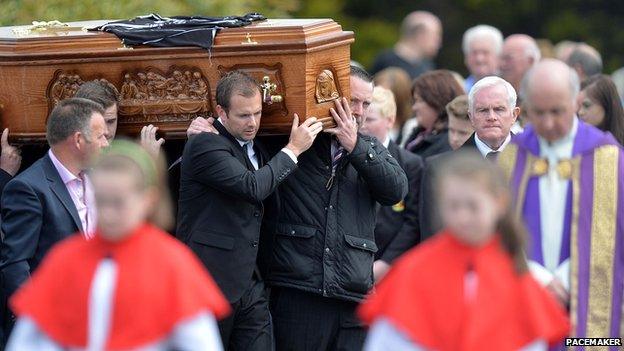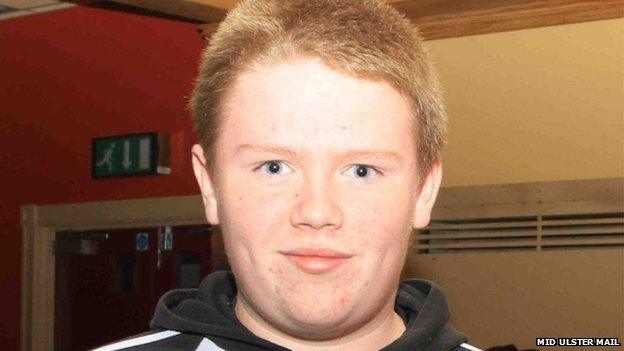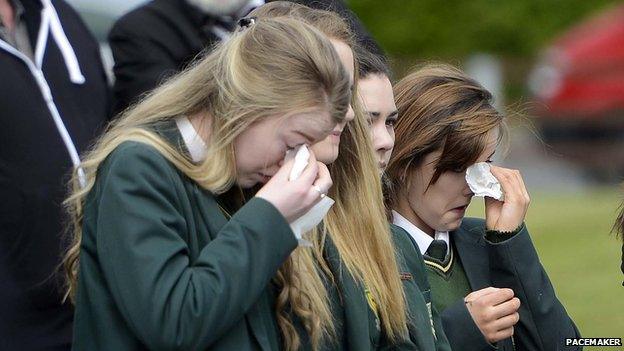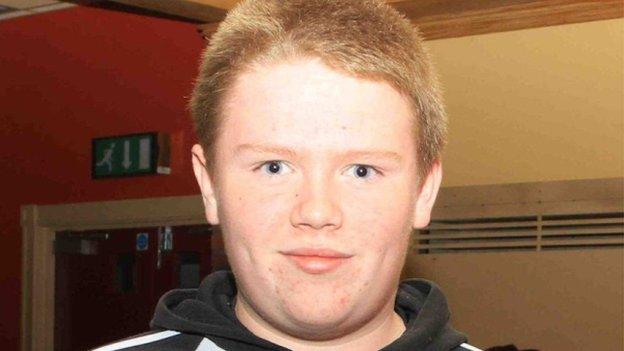Ronan Hughes: Funeral held for Coalisland schoolboy
- Published
Ronan Hughes's friends carried his coffin at the funeral at St Patrick's Church in Clonoe, County Tyrone
A schoolboy understood to have taken his own life after being tricked into posting images online was taken "advantage of and exploited", a priest has told mourners at his funeral in County Tyrone.
Police are investigating the circumstances surrounding the death of Ronan Hughes, 17, from Coalisland.
He died on Friday, 5 June.
His funeral took place at St Patrick's Church in Clonoe, where he and his brother Cathal were altar boys.
Parish priest Fr Benny Fee told mourners it was a "bitter, bitter privilege to welcome Ronan here to St Patrick's where he was no stranger".
"Ronan did not take his own life but his life was taken from him, and somewhere in the world, maybe far, far away from Clonoe, is a man, a woman or a gang who are guilty of a heinous crime," Fr Fee said.

Fr Benny Fee told mourners that Ronan's "life was taken from him"
"People took advantage of his youth and his beauty. They exploited him and they broke him. And if they could do it to him, they could do it to anyone. May God forgive them."
Pupils from Ronan's school, St Joseph's Grammar in Donaghmore, County Tyrone, formed a guard of honour at the church.
Concerns
Police have said a crime is not suspected and inquiries are continuing.
They have issued advice to young people about the need to be careful when using social networking sites.
Mid-Ulster district commander Supt Mike Baird described the boy's death as "tragic".
It is understood that Ronan had told his parents and the police of his concerns about the online images last week.
St Joseph's Grammar head teacher, Geraldine Donnelly, published a statement on the school's website expressing sadness at the "untimely death of our dear pupil".

Ronan Hughes was a pupil at St Joseph's Grammar in Donaghmore, County Tyrone
He was also a talented Gaelic Athletic Association (GAA) player and a member of Clonoe O'Rahilly's GAA club in County Tyrone. In a statement, the club said they were "shocked and saddened" by his death.
They described him as a "quiet and modest young lad who was popular among all players and coaches".
Geraldine Donnelly, the principal of St Joseph's Grammar School in Donaghmore, says she believes Ronan Hughes was being blackmailed
"His death has left a dark shadow hanging over our club," they said.
SDLP councillor Malachy Quinn told BBC Radio Ulster's Good Morning Ulster that Ronan "had everything to live for".
"For these people to bring somebody like that down to the point where they think they have no way out - you can't really imagine just what would go through a young person's mind for that to happen," he said.
Global
Online safety expert Wayne Denner said the case showed the impact of technology on the lives of young people and the challenges that can bring.
"Mistakes are going to be made, but we need to educate [young people] on how to take control of their online reputation and how to use social media and the internet to their advantage, not to their disadvantage," Mr Denner said.

St Joseph's Grammar, the school Ronan attended expressing its sadness at the "untimely death of our dear pupil"
"Don't connect with people you don't know, know how to set up your privacy settings, and fundamentally, don't post anything online that you're not happy with going on a global billboard.
"Effectively, once it makes its way online it's very difficult to take it down."
ChildLine, the counselling service for children provided by the NSPCC, external, has been working with the Internet Watch Foundation and can help young people under 18 to get online images removed.
A spokeswoman for Childline said: "Cyber-bullying is a huge concern and the 24-hour nature of the internet means they can feel like there's no escape.
"We must ensure young people have the confidence to speak out against this abuse, so that they don't feel isolated and without anywhere to turn."
If you or someone you know is in distress or despair, you can contact Lifeline on 0808 808 8000 or visit their website, external, or Childline on 0800 1111 or visit their website, external.
- Published8 June 2015
